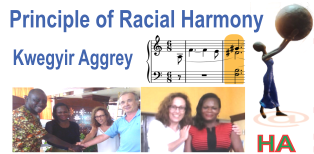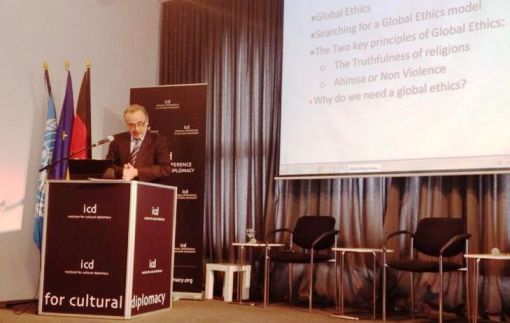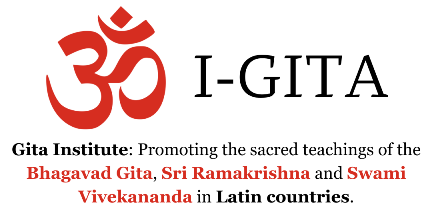Global Ethics and International Business

Religions (Hinduism, Islam, Christianity): sources of the global ethics. Ahimsa
- Introduction to the Global Ethics
- Searching for a Model of Global Ethics
- Religions as “Wisdom traditions” of humanity: one of the main Global Ethics sources
- Shared ethical principles of humanity
- The Golden Rule (“Ethic of Reciprocity”)
- The two fundamental principles of the Global Ethics;
- Harmony of Religions (Sri Ramakrishna)
- Ahimsa (Non-Violence)
- Compatibility of the Model of Global Ethics with the Religions of the World
- Implications for the international marketing
- Businesspeople who apply models based on the Global Ethics
- Why do we need Global Ethics?



The objectives of the subject “A Model of Global Ethics for international business” are the following:
- To define the pillars of a Model of Global Ethics
- To understand the religions of humanity as the sources of a Model of Global Ethics
- To analyze the two fundamental principles of the Global Ethics: Ahimsa (non-violence) and Harmony of Religions
- To reflect about the impact of a Model of Global Ethics on the international business (marketing, strategies, and relationships)
- To analyze the profile of Businesspeople who apply Models of Global Ethics
intended for all those who wish to implement a Model of Global Ethics in their companies based on the principles of the Harmony of Religions and Ahimsa (non-violence).

The Subject “Global Ethics” belongs to the following Online Programs taught by EENI Global Business School:
Doctorate: Ethics, Religions & Business, World Trade.
Master: International Business.
Bhagavad Gita Courses: Karma Yoga, Bhakti Yoga, Jnana Yoga, Dhyana Yoga, Realization of the Gita
Languages:  or
or  Ética Global
Ética Global  Ethique mondiale
Ethique mondiale  Ética global.
Ética global.
- Credits of the Subject “Global Ethics”: 1

- Duration: one week
- Download the Subject Syllabus: “Global Ethics” (PDF)

EENI Principle of Racial Harmony (James Emman Kwegyir Aggrey).

Global Ethics and International Business
“The principle of the Non-Violence of Mahatma Gandhi and the testimony of Sri Ramakrishna to the Harmony of Religions: here we have the approach and spirit that can make it possible for the human race to grow together into one family.” Arnold Toynbee.
“Ethics consist in experiencing the compulsion to show to all will-to-live the same reverence as I do to my own.” Albert Schweitzer.
Global Ethics: “common values shared by the Humanity.”
“A common fundamental vision of what is legitimate, just, and fair. A global economic ethics relies on the moral principles and values that from the immemorial time have been shared by all the cultures and have been supported by a common practical experience.” Manifest for a Global Economic Ethics.
Where can we find the sources of the Global Ethics?
Religions as the “wisdom traditions” of humanity: one of the main Global Ethics sources.
“Who are the greatest benefactors of the living generation of Humanity? Confucius, Muhammad, Lao Tzu, Jesus, Buddha, Zoroaster, the prophets of Israel and Judah, and Socrates.” Sir Arnold Toynbee.
Perhaps many people in the West prefer to speak of “Wisdom Traditions” instead of religions.
Instead of looking for differences (Concept of Intercultural Management); we will search for points of convergence, facilitating dialogue, cultural diplomacy, international relations and global business.
Religions (Ethics) influence significantly in the way of doing business in each market, especially in the “non-Western” countries. The great part of humanity - Africa, Latin America, Arab Countries, India, and Southeast Asia - is much more spiritual than the West.
In many countries, mixing religion and business is considered taboo. However, we disagree if we do with respect and knowledge.
The West needs to change his world's vision, and understand that the world is different; and only with the knowledge and respect to the others, the West can represent a similar role it in the new order.
The science can save lives, but also can destroy it. Religions have a positive aspects but also negative. There are many essays about the negative dimensions of the religions, a reality that history has taught us. However, the religions also have a positive side, as ancient wisdom sources, emanating ethical principles shared by almost all the higher religions.
“We should adapt the science for the advantage of Humanity” Haya Sindi (Saudi Arabia).
“The Harijan movement (Untouchables) is too big for a mere intellectual effort. There is nothing so
wrong in the entire world that the caste system. Moreover, yet I cannot leave my religion and therefore Hinduism.
My life would be a burden to me if Hinduism failed me.
I love Christianity, Islam,
and many other faiths through Hinduism. Take it away, and nothing remains for
me. However, then I cannot tolerate it with untouchability the high-and-low
belief.” Mahatma
Gandhi
Sources of Global Ethics.
- The Universal Declaration of Human Rights (United Nations)
- The Cairo Declaration on Human Rights in Islam (Organization of Islamic Cooperation)
- The Declaration on Fundamental Principles and Rights at Work (International Labour Organization)
- The Rio Declaration on Environment and Development
Declaration Towards a Global Ethic
In the Parliament of the Religions of the World, Chicago (1993) (since 1893, the speech of Swami Vivekananda, a disciple of Sri Ramakrishna), lead by Hans Kung, the representatives of all the Religions of the World agreed on the core elements of a shared ethic.
- Principle of Humanity
- Golden Rule of Reciprocity
- A commitment to the Non-violence, justice, truthfulness, and partnership between men and women
Global Ethics:
- It is not proselytism
- It is not based on the superiority of any religion
“Today there is no living being who know enough to say for sure if a religion has been more important than all others.” Arnold Toynbee - It is not a global religion (like Baha’i)
- It is open to agnostics and atheists
- A “Global ethic for business” - is still in its development phase
The weakness of the Global Ethics: fundamentalists of all religions and atheists.
Searching for a Model of Global Ethics.
The scenario for our research of the Global Ethics: India.
- India is the cradle of four higher religions: Hinduism, Jainism, Buddhism, and Sikhism. Today, India is a “little world” under religion's point of view
- India, particularly Hinduism, is one of the most tolerant countries with other religions
- India is the world's third largest economy (behind the U.S. and China) and one of the BRICS Countries
- India is the largest democracy in the World
Director of International Business and Global Ethics.

The founder of EENI, Pedro Nonell imparting the conference on “Cultural Diplomacy, International Business and Global Ethics” - The Religions of the World as the sources of the Global Ethics at the Institute for Cultural Diplomacy (Berlin - Germany).
(c) EENI Global Business School (1995-2024)
We do not use cookies
Top of this page




